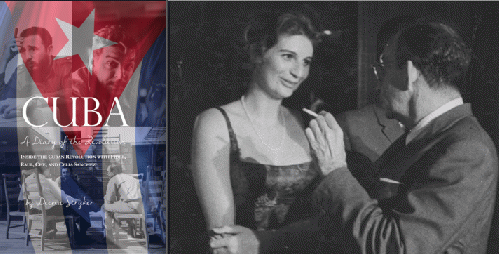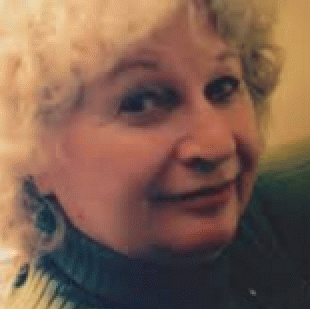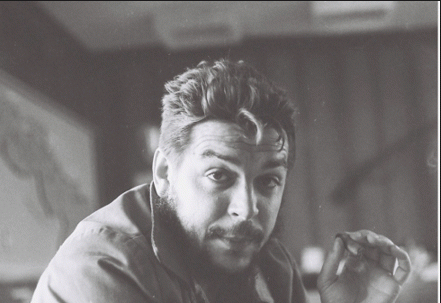Broadcast 6/15/2016 at 11:56 PM EDT (15 Listens, 12 Downloads, 1880 Itunes)
The Rob Kall Bottom Up Radio Show Podcast
| Copyright © Rob Kall, All Rights Reserved. Do not duplicate or post on youtube or other sites without express permission. Creative commons permissions for this site do not apply to audio content or transcripts of audio content. | ||||

Deena Stryker with Raul Roa Cuba's Foreign Minister
(Image by Tayen Lane- Book Cover, Deena Stryker photo on right) Details DMCA
Deena Stryker studied in Paris, became a French citizen by marriage, debuted at Agence France Presse in Rome, then, as Deena Boyer, followed Fellini's creative process for The Two Hundred Days of '81/2'. The proceeds enabled her to interview Fidel Castro for a major French weekly, meeting with him again a week after the Kennedy assassination, and several times in 1964 for this book, as the other members of the government (including Che Guevara, Raul Castro and Celia Sanchez), told her in their own words why they had made the revolution. In the seventies, she was a speech writer in the Carter State Department
Deena now lives in Philadelphia and is a senior editor for OpEdNEws.com
A new, revised edition of her classic book, CUBA, A DIARY OF THE REVOLUTION, Inside the Cuban Revolution with Fidel, Raul, Che, and Celia Sanchez has just come out.
Very rough notes from the audio interview.
Rob: This book was written 50 years ago. What's it about and why should people read it now?
finally, after 54 people have finally decided that it's time to engage with fruitful relations at all levels.
Fidel has announced that he won't be around for long.
Rob: Tell us about your book. What's it about.
I was working at the French news agency in Rome and seeing all the news about the revolution. People who had been to Cuba had a completely different take on what was going on. I decided I had to see who was right-- the corporation of journalism or these other free floating people who didn't answer to any corporations.
Rob: in the book, you interview Fidel, Che and almost all the leaders of the revolution.
It was a series of lucky breaks and perseverance. I had to get across to Fidel that I was sincerely interested in finding out about the revolution and I didn't have any prejudices to it.
I had done something that no-one else had done-- gone around the barriers for Americans, by using a French passport. I think they saw me as someone who kind of had a kindred spirit with them.
They were unconventional, like the way they commandeered trains to send people to train illiterates in the country-side.
I flew to Mexico on my American passport, then flew to Cuba and entered on my French passport.
I had to start from scratch, going to the foreign ministry, to do an article about Fidel, for Paris Match, not a political article, but about Fidel as a person.
I had enough money for three weeks. After three weeks I was coming up dry. I was pretty annoyed and vented my anger " the next day I was in the foreign minister's office, telling him that I had a major French magazine ready to publish an article.
The next day I was in the office of the head of propaganda. We sparred over a number of points, and then he said he'd pass on my request.
Rob: at the point you did the interview with Castro, had you done the other interviews that are in the book.
They came afterwards, after I'd done the five meetings with Castro.
After I did the story for Paris Match, the Cubans invited me to come back to see more of the revolution. I accepted the invitation but had planned to go in a few months. But then, Kennedy was shot. I was afraid it would be harder to get into Cuba with Johnson (as president) So I was back in Cuba within ten days.
I asked each of the participants in the government why they had made the revolution. Fidel was pleased with the idea, so he made it possible, through Celia Sanchez, to meet with each of the officers. I had a conversation with each of them.
Celia Sanchez was a remarkable woman. She was an exceptional person I enjoyed spending time with. She would tell me stories of being in the Sierra. She was the surrogate mother to all of them.
As for Raul, who has been in charge since Fidel has been in bad health, I tell about my meetings with him, his wife, his kid.s
Che Guevara, who I met in his office. he didn't like meeting with journalists. I got not only a remarkable idea of him but also a remarkable portrait.
Rob: In you r book, in your interview with him, you are pretty brave in your banter with him. You challenge him and confront him.
I wasn't your typical journalist fawning over the subject.
Rob: Has that been your style since then.
when we work with OpEdnews you've had a sample of that.
Rob: yes.
I was very aware of a call for a new information order coming from the third world. This problem of journalistic bias or writing what your paymasters want you to write has been the subject for debate in the political world for decades. It's not a new problem. it goes back a long way. I'm often amazed that some journalists today say that in the 60's and 70's journalism was more objective. It wasn't
Rob: How did the world react to what you wrote about your visits to Cuba and your interviews?
For years the book stayed in a drawer. I had a contract with an Italian publisher. The book was 400 pages long and he cut it to 150 pages and I just couldn't see it shorn so much. I got him to agree to put back 50 pages"
It was published in the US in 2004.
Now it is going to be given a full fledged launch by Tayen Lane. The first copy of the book sh ould be arriving any day now.
Rob: It took a long time.
Yes But I am persistent.
Rob: Did you ever publish the article Paris Match. What was the response to that?
IT was very hard in those days to get Cuba in front of the public.
Rob: There was a lot of propaganda. Talk about the propaganda
Alma Guillermo Prieto published an article that I am writing a rebuttal to. It's almost like it is required to be negative about Cuba.
What was your overall impression Cuban of 1963 and Fidel?
Fidel cared very much bout the Cuban people and he ate slept and drank revolution.
He was extremely popular. I don't think he ever lost his popularity. There was a really vibrant cultural life. Culture always played a big role. Fidel said, "With the revolution everything is permitted, against the revolution, nothing."
Carlos Rodriguez,
Rob: In the interview, you quote Fidel as saying, In the end, the revolution will be judged by what it accomplishes and we have so many needs."
free, high quality medical care, education have been two primary goals and investments of the revolution. That has already been recognized.
I'm sure Cubans are glad they are not Haitians. When a cyclone happens in Haiti it is a major disaster. When ti happens in Cuba, they take good care.
Rob: Fidel said to you, "Listen, the fact that they're rich or poor is not our fault; that's precisely the fault of capitalism." That could have come out of Occupy Wall Street.
The French government tried to roll back all the progress that the labor movement made over the last century. Capitalism is still wreaking havoc all over the world. The current occupy movement that's going international will definitely have a socialist aspect.
Rob;Tell us more about the new occupy movement.
French parliament is trying to shift the workweek back from 35 to 48 hours, shifting overtime to 10% more.
Protesters have invited leaders from across Europe and beyond to reflect on taking this Occupy movement worldwide.
What's really important about the new situation in Cuba is that they shouldn't lose all that they've gained in all these years-- the sense of equality, the sense of fraternity. That shouldn't be completely over-ridden
Rob: I would expect that the neocons and neoliberals are planning away at doing with with those gains.
Rob: What's your take on what's happening with Dilma Roussef in Brazil.
We're trying to get at each one in whichever way we can, starting with the most vulnerable, such as Latin American Brazil and while we're at it Venezeuela.
Rob: Fidel told you, "I believe all of us should help the countries that still have to liberate themselves, and Cuba has already provided an example that imperialism can be vanquished, that the struggle can be worthwhile. It would be absurd to say we can't help the other countries, but we do need to respect international laws." That's a strong threat to the rest of the world.
It's not really a threat because Cuba has no military power. That's what he was about in 1963 64 and the movement of international solidarity has grown since then. Cuba put its money where its mouth was. Cuba sent help for Africans to overthrow very bad governments. They sent doctors to fight Ebola. Those are the ways that Cuba has helped other countries. It isn't about invading and bombing. It's about facts on the ground that affect people.
Rob: you asked Fidel, "But don't you think that in Latin America, what's lacking in all those countries that dream of revolution, is a leader?" Castro replied , "I don't think it's men who make history. Men, individuals, are the little motor, but the big motor is the masses. Individuals are only the little motor that sets the big motor in motion."
This was asked is part of a conversation on whether he'd be willing to lead another revolution somewhere else.
he said when he climbs the Turquino mountain, he realizes he's not as young as he used to be.
Rob: Talk about Che
He didn't agree that revolutionaries should go around courting women because they didn't have time bringing them flowers. Che was another person, like Fidel, who was totally devoted to the revolutionary idea and anything that got in the way was of no interest to him. He told young communists not to get old and stodgy, but basically, to keep their revolutionary ideas, the pure revolutionary. someone who doesn't mess around with women, no frivolities, every waking minute being about revolution. Fidel was like that too but in a l ess fanatic way. Another thing about Che, during the time I was there I never saw him anything but a sloppy, everyday uniform and the beret slapped sideways on his head, totally unwilling to bow to any convention, while came in a beautiful uniform made in Moscow
granma.cu or .com, paper put out by the cuban. communist party. I would encourage people to take the first boat to Cuba that they can.
Deena's website otherjonesii.blogspot.com
Size: 26,297,872 -- 0 hrs, 54 min, 46 sec











